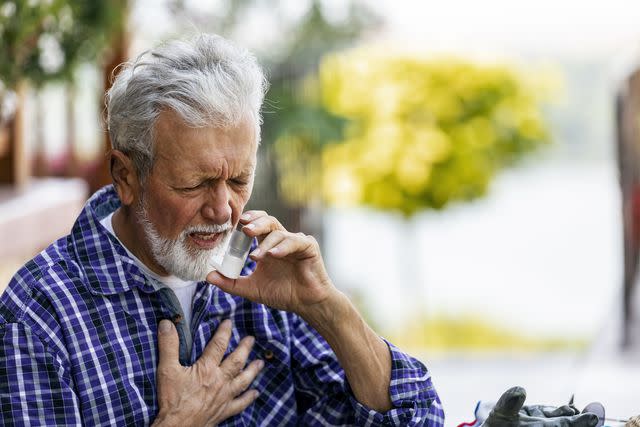Can Bronchitis Turn Into Pneumonia?

Roos Koole
Bronchitis can turn into pneumonia in some cases if the infection spreads from one part of the respiratory tract to another.
Pneumonia and bronchitis are different respiratory infections but they often have similar symptoms, like fever and cough. Bronchitis is usually caused by a virus, while pneumonia is frequently caused by a bacterial infection and will require antibiotics. However, acute bronchitis can lead to either viral or bacterial pneumonia.

Roos Koole
This article discusses how to prevent bronchitis from turning into pneumonia and when to see a healthcare provider.

RealPeopleGroup / Getty Images
Learn More:Is It Bronchitis or Pneumonia?
Causes of Bronchitis and Pneumonia
The causes of bronchitis and pneumonia often differ, though at times they can be the same.
Bronchitis
The most common cause of bronchitis (90% to 99% of cases) is a viral infection. Among these, the most frequently found viruses include:
Rhinovirus
Human metapneumovirus
Only 1% to 10% of bronchitis infections are bacterial in origin.
Some of the risk factors for bronchitis include:
Living or working in settings where you're more likely to be exposed to the offending viruses
Smoking
Exposure to air pollution or chemical irritants at work
Immunosuppression
Pregnancy
Gastroesophageal reflux disease (GERD)
Learn More:Causes and Risk Factors of Bronchitis
Pneumonia
There are many different causes of pneumonia, as well as differences in the way it may develop (ways that bacteria can reach the lower airways), including:
Community-acquired pneumonia, which occurs on it’s own or following an upper respiratory infection or bronchitis and involves the extension of the infection into the lower airways
Nosocomial pneumonia (hospital-acquired pneumonia), which develops in the hospital and frequently involves different (and sometimes resistant) bacteria
Aspiration pneumonia, which occurs when bacteria from the mouth or stomach are inhaled into the lungs (often in someone who has difficulty swallowing or is unconscious)
Community-acquired pneumonia is the most common.
In adults, the most common cause of community-acquired pneumonia is a bacterial infection. Of these, Streptococcus pneumoniae (pneumococcal pneumonia) is most common.
In children, viral causes of pneumonia are more common than they are in adults, with respiratory syncytial virus (RSV) being the most common cause in children less than 5 years old. Pneumococcus (Streptococcus pneumoniae) remains the most common cause in children 5 years and older, with other important causes including mycoplasma and chlamydia.
In some cases, fungi are responsible, as well as chemical exposures (chemical pneumonia).
It's important to note that while acute bronchitis may lead to either bacterial or viral pneumonia, it does not lead to fungal or mycoplasma pneumonia.
Learn More:Causes and Risk Factors of Pneumonia
Preventing Pneumonia
Receiving appropriate treatment for bronchitis (and taking care of yourself when it occurs) is an important way to reduce the chance that it will progress to pneumonia. In order to do so, however, it's important to know whether or not you have bronchitis.
Symptoms of bronchitis may include:
A cough that can be annoying and persistent
Mucus that may be clear, yellow, or green
Low-grade fever (less than 100 degrees Fahrenheit) that is usually present only at the start of the infection
Congestion, headache, sore throat
Mild chest discomfort
Most of the time, bronchitis is due to a viral infection, so antibiotics are not helpful.
In cases in which bronchitis is indeed bacterial, prompt treatment with antibiotics may reduce the risk of the infection progressing to pneumonia. While often very effective against the bacteria they target, antibiotics do not always prevent pneumonia (pneumonia may occur due to a different type of bacteria that does not respond to the antibiotic chosen).
Unfortunately, taking an antibiotic for a viral infection will not prevent the development of bacterial pneumonia. Instead, the pneumonia may simply be resistant to the antibiotic used.
Resting, sleeping when necessary, and getting adequate fluids is very important. Keep in mind that resting may help your body heal more quickly so that your immune system can better fight off other viruses and bacteria, such as those that may cause secondary pneumonia.
Certainly, infection prevention measures are important to lower the chance you will spread your infection to others. These include:
Careful handwashing with soap and water (ideally, for at least 20 seconds)
Using hand sanitizer if a place to wash your hands isn't readily available
Wearing a mask to lower the chance you'll spread respiratory droplets
Staying away from others who could catch your infection
Avoiding crowds
Covering your mouth and nose when coughing or sneezing
Get Vaccinated If You Qualify
Pneumococcus is the most common cause of pneumonia in adults and children more than 5 years old, and it can often be prevented with vaccination. While the vaccines (PCV13, PCV15, PCV20, and PPSV23, which have different indications) are not recommended for healthy people between the ages of 2 and 64, they may decrease the risk that bronchitis will turn into pneumonia, at least pneumococcal pneumonia, for a number of people. Vaxneuvance (PCV15) is indicated in people 6 weeks and older.
The pneumonia vaccine is indicated for:
Children younger than two years old or those two to four years old who are unvaccinated or did not get the full four doses of PCV13
Children older than 6 weeks
People 65 years and older
People with lung conditions such as chronic obstructive pulmonary disease (COPD) and asthma
People who smoke or drink heavily
People who may be immunocompromised (such as those with cancer, heart disease, liver disease, diabetes, HIV, kidney disease, sickle cell disease or other hemoglobin disorders, or on certain medications) or who do not have a functioning spleen
People with solid organ transplants
People with cerebrospinal fluid leak or cochlear implant
Groups at Risk
Some people are more at risk than others to develop pneumonia as a complication of bronchitis. These include:
Young children or older adults (more than 70 years of age)
People who smoke
People who live in crowded conditions or in a group setting such as a nursing home
People with medical conditions that could lead to aspiration, such as swallowing difficulty, neuromuscular disease, stroke, seizure disorder, alcohol abuse, or dementia
People with lung conditions such as asthma, COPD, cystic fibrosis, lung cancer
People who are immunosuppressed due to medications, cancer treatments, immunodeficiency disorders, etc.
Those who have the greatest risk are often those who have a combination of these risk factors, or those who are unaware that they have bronchitis and do not receive appropriate treatment.
Bronchitis vs. Pneumonia Symptoms
Many of the symptoms of bronchitis and pneumonia are similar, but there are some key differences (outlined below).
| Bronchitis | Pneumonia | Key Differences |
Appearance | Mildly to moderately ill | Moderately to severely ill | X |
Fever | Usually less than 100 degrees | Often higher than 100 degrees, shaking chills may be present | X |
Cough and sputum | Bothersome, may be productive of clear, yellow, or green sputum | Bothersome. Same, but sputum may appear rusty or blood-tinged or be foul-smelling | |
Timing | Usually resolves in two to three weeks | May occur anytime after a diagnosis of bronchitis | |
Respiratory rate | Normal | Normal to over 24 breaths per minute | X |
Heart rate | Normal | Normal or over 100 beats per minute | X |
Associated symptoms | Head congestion, sore throat, headache | Loss of appetite, confusion (in older people) | |
Nausea, vomiting, diarrhea | Usually absent | Present in around 20% | |
Energy level | Some fatigue | Fatigue may be severe | |
Chest pain | May have aching chest pain due to coughing | May have sharp or localized chest pain |
When to See a Healthcare Provider
Certainly, it's important to contact your healthcare provider if you have any concerns at all. Our bodies are fairly good at telling us when something is wrong, and if you just don't feel right, by all means call. But it's also important to contact your practitioner if:
You have symptoms such as coughing or wheezing that persist beyond two to three weeks.
Your symptoms start to get better and then worsen again.
You cough up mucus that smells foul or has a rusty or blood-tinged appearance.
You develop a high fever (over 100 degrees F, and especially if it is over 101 degrees F).
You feel short of breath, especially if you note any shortness of breath at rest.
You have chest discomfort (other than the chest discomfort that comes from coughing).
You develop nausea, vomiting, or diarrhea after you have been dealing with bronchitis for more than a day or so.
You cough up blood, even if it is just a trace.
You note a bluish color (cyanosis) to your fingers or lips.
It's especially important to see your healthcare provider (and have a chest X-ray) if you are feeling short of breath, have an elevated respiratory rate, or an elevated heart rate.
In adults, very important signs that suggest bronchitis has progressed to pneumonia include:
Shortness of breath
Increased heart rate
Increased respiratory rate
Bronchitis is an infection that can sometimes progress to pneumonia. The positive thing is that while this can be frightening, there are things you can do to both reduce your risk as well as make sure you are diagnosed if it happens.
Perhaps more important than understanding these conditions, and when to worry, is being your own advocate. You know your body. If something seems wrong, or you feel like something bad could happen, talk to your healthcare provider. Our bodies do a remarkably good job of letting us know when we should be concerned if we'll only listen.
